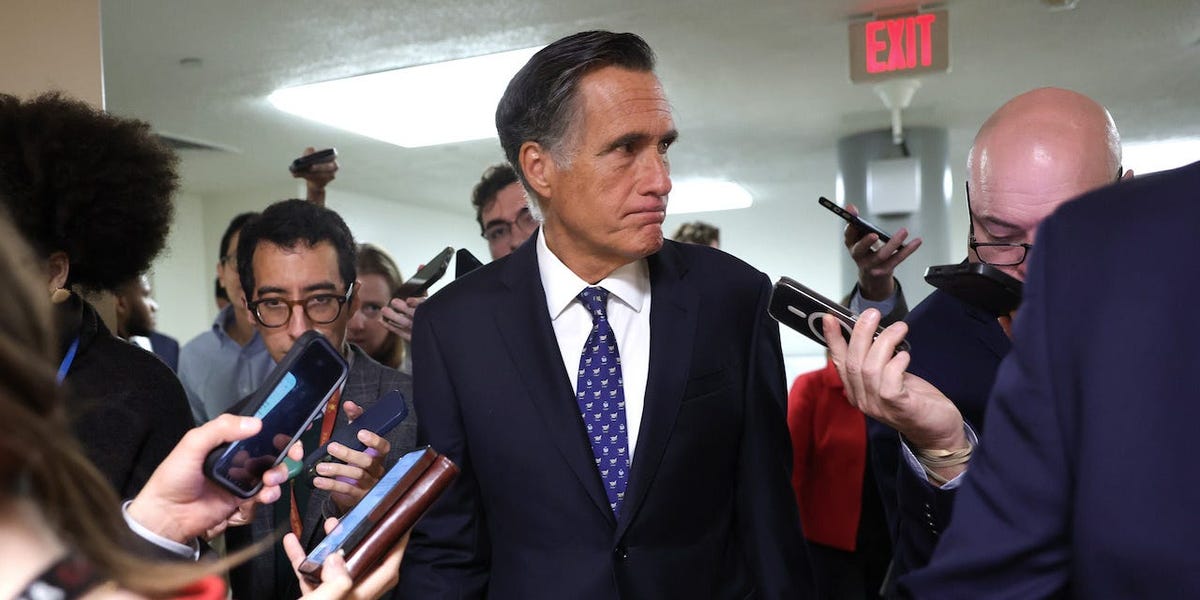- Romney faced widespread criticism after telling Insider that bike lanes are “the height of stupidity.”
- Utah bicycling groups sent a letter to their US senator asking him to “reconsider” his position.
- Democratic Sen. Brian Schatz called Romney’s position on bike infrastructure “flat wrong” and “wacky.”
Nine Utah groups that support bicycling sent a letter to their US senator, Mitt Romney, requesting that he “reconsider” his recent comments to Insider calling bike lanes “the height of stupidity.”
The Republican lawmaker told Insider last month that he opposes bike lane construction that replaces car lanes, claiming that it increases automobile carbon emissions by worsening traffic congestion. Romney also told Insider that he opposes federal legislation that would offer tax rebates on electric bicycle purchases.
The groups pointed out in their letter that “bike lanes are proven to reduce car traffic and resulting emissions,” citing studies by Carnegie Mellon University and McGill University.
“We invite you to join any of us for a bike ride to highlight the value of functional bike infrastructure in Utah,” they wrote, calling his views “both inaccurate regarding emissions and hurtful to the exploding number of Utahns who opt to travel by bicycle.”
“We ask you to reconsider this statement and listen to your constituents who support investing in the connected, protected bike infrastructure keeping Utahns safe and active,” they wrote.
Spokespeople for Romney didn’t respond to Insider’s request for comment for this article.
Sen. Brian Schatz, a Hawaii Democrat who introduced the E-BIKE Act, told Insider that Romney’s arguments regarding cycling are “wrong” and that he’d speak with him privately about the issue.
“I love Mitt,” Schatz told Insider recently in the Capitol. “I don’t want to get in a public fight with him because he’s one of the Republicans that I admire the most, but he’s just flat wrong on substance here.”
“This idea that you’re either a pedestrian, or an automobile driver, or a transit user, or a biker, has no basis in reality,” Schatz said. “Most people are all of those things depending on the day and depending on the circumstances. And so the basic principle in transportation is, however people want to move around, efficiently and safely, the federal government should enable that.”
Schatz argued that cities and states put bicyclists and other micro-mobility users in an increasingly untenable position by failing to provide safe and adequate infrastructure. He called Romney’s argument that bike lanes increase emissions “wacky.”
“Bikes are increasingly a viable way for people to move around — it’s often cheaper, more efficient, and more enjoyable,” Schatz went on. “We’re not forcing anybody from an automobile onto a bike, but the truth is, the market is starting to demand that, but the bike lanes haven’t caught up. So now you have a bunch of bike users, or would-be bike users, and a relatively dangerous transportation system for them.”
Rep. Earl Blumenauer, an Oregon Democrat and one of Congress’ biggest biking advocates, told Insider this week that Romney’s comments don’t make sense.
“Every person on a bicycle is somebody who’s not in a car in front of you,” he said.
He added, “I’ve been working with bike lane construction all my career, and I’ve heard the complaints and the arguments that they’re concerned about congestion or damaged property. And then in a matter of months, people are putting in their real estate advertisements that it’s next to a bike lane. These are extraordinarily popular.”
Rep. Mike Quigley, an Illinois Democrat who told Insider he rides his bicycle around DC “more than any other member by a factor of ten,” insisted that protected bike lanes are key for road safety.
“As much as I ride my bike, unless it’s a protected bike lane I don’t trust it,” he said.
Quigley argued that biking advocates have to make both data-based and emotional arguments for better infrastructure. He described Romney as “a very prominent person — otherwise pretty smart — who doesn’t get the fundamentals of what we’re trying to do and why.” Advocates have to make the case that biking is healthier and better for the environment than driving, while also appealing to the uniting desire to keep kids and families safe on the roads, he said.
“It’s not just getting the resources there, it’s changing the culture and the state of mind,” Quigley said.




